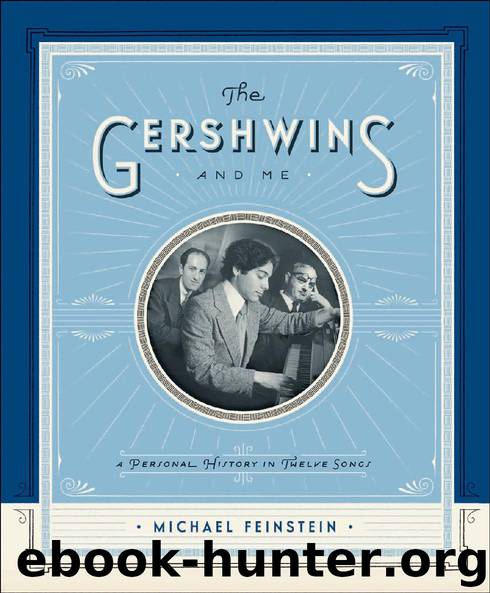The Gershwins and Me by Michael Feinstein

Author:Michael Feinstein
Language: eng
Format: epub
Publisher: Simon & Schuster
George and Ira arriving in Los Angeles in 1936.
As in all things, interpretation comes down to a matter of taste, on the part of both the performer and the audience, and some people enjoy a wider variety of interpretations than others. For example, George liked interpretations besides his original one much more than Ira did. This is why George loved to hear other people play variations of his songs as much as he liked to play them himself.
Ira and I agreed on most things. Like me, Ira loved the way Judy Garland sang his songs—especially when she did it in his living room, though he did comment that she had periods where she sounded more quavery, especially in the forties. But we didn’t agree about everything. Like Ella Fitzgerald. Ella made what many consider one of the iconic Gershwin recordings, Ella Fitzgerald Sings the George and Ira Gershwin Songbook, with the Nelson Riddle Orchestra. It was a deluxe boxed set, five LPs with liner notes, released in 1959, and Ira was crazy about it while I was not. Riddle is considered today to be the most important popular song arranger of the fifties and sixties, and yet, much as I agree with that assessment and revere him, I find many of his Gershwin arrangements disappointing. They are brilliant arrangements, of course, but in many instances he dispensed with the original harmonies, and I miss them. Riddle’s version of “Love Is Here to Stay” uses a repeating six- or seven-note phrase, a bluesy riff, throughout as accompaniment. It works well, but I still long for what Gershwin wrote for that number. It’s a matter of how one is reared on the songs to begin with and what other renditions are compared with what we know. Most people wouldn’t know what the original harmonies are anyway and therefore have nothing to compare to.
While both Ella Fitzgerald and Nelson Riddle are iconic figures, my preference with Ella and Gershwin is for her earlier and simpler renderings with Ellis Larkins at the piano. I once worked up the temerity to tell her so. She said, “I understand. They’re more intimate.” (I also think the Sarah Vaughan Gershwin interpretations are more interesting and spontaneous as jazz renderings than Fitzgerald’s, but Ira strongly disagreed about that, too. He didn’t even want to listen to the rest of her double Gershwin LP when I started to play the tracks for him. For me Hal Mooney’s arrangements on that collection are lovely and underrated.)
I don’t think Ella Fitzgerald was always a deep interpreter of lyrics. She was often inside the song musically but not lyrically, yet she was so talented that it didn’t always matter. Listen to the 2009 box set of unreleased live recordings from 1961 and 1962 called Twelve Nights in Hollywood and prepare to be dazzled. Like all of her recordings before a live audience, these are the pinnacle of extraordinary spontaneous and joyful expressions of her art. Her voice was a marvelous instrument, but
Download
This site does not store any files on its server. We only index and link to content provided by other sites. Please contact the content providers to delete copyright contents if any and email us, we'll remove relevant links or contents immediately.
| Actors & Entertainers | Artists, Architects & Photographers |
| Authors | Composers & Musicians |
| Dancers | Movie Directors |
| Television Performers | Theatre |
Cecilia; Or, Memoirs of an Heiress — Volume 2 by Fanny Burney(31931)
Cecilia; Or, Memoirs of an Heiress — Volume 3 by Fanny Burney(31923)
Fanny Burney by Claire Harman(26588)
We're Going to Need More Wine by Gabrielle Union(19028)
Plagued by Fire by Paul Hendrickson(17396)
All the Missing Girls by Megan Miranda(15910)
Cat's cradle by Kurt Vonnegut(15316)
Bombshells: Glamour Girls of a Lifetime by Sullivan Steve(14043)
For the Love of Europe by Rick Steves(13840)
Leonardo da Vinci by Walter Isaacson(13300)
4 3 2 1: A Novel by Paul Auster(12360)
The remains of the day by Kazuo Ishiguro(8961)
Adultolescence by Gabbie Hanna(8908)
Note to Self by Connor Franta(7660)
Diary of a Player by Brad Paisley(7542)
Giovanni's Room by James Baldwin(7309)
What Does This Button Do? by Bruce Dickinson(6190)
Ego Is the Enemy by Ryan Holiday(5400)
Born a Crime by Trevor Noah(5366)
